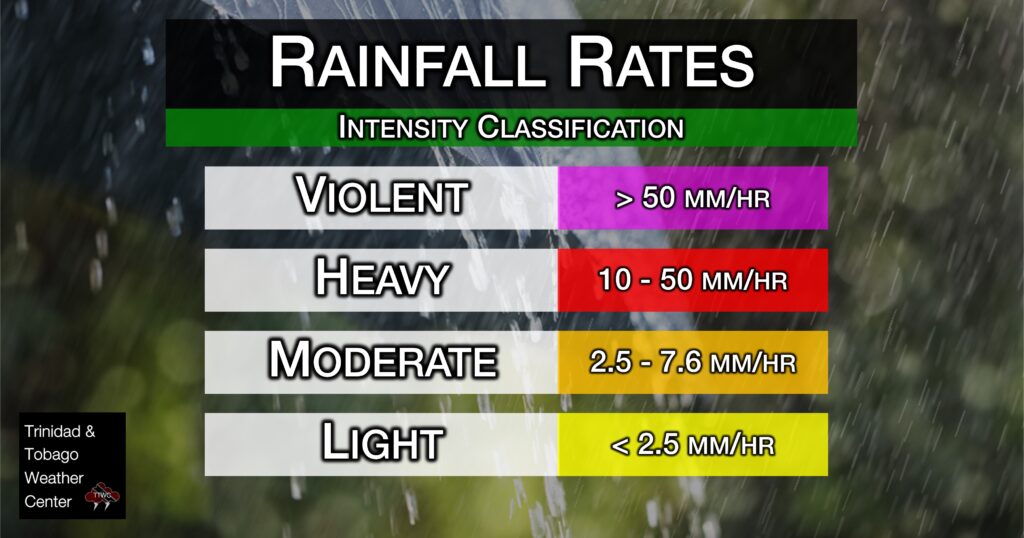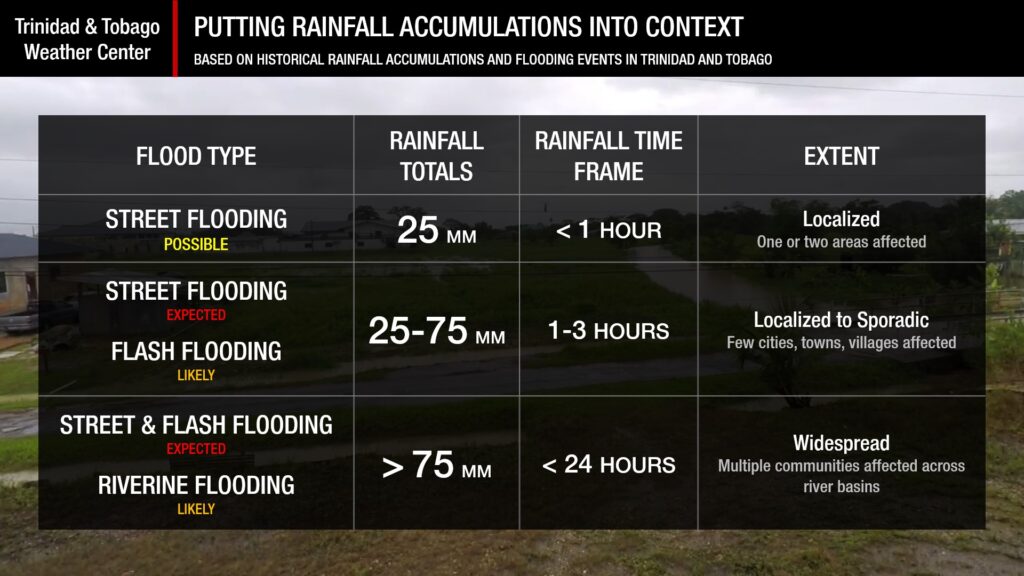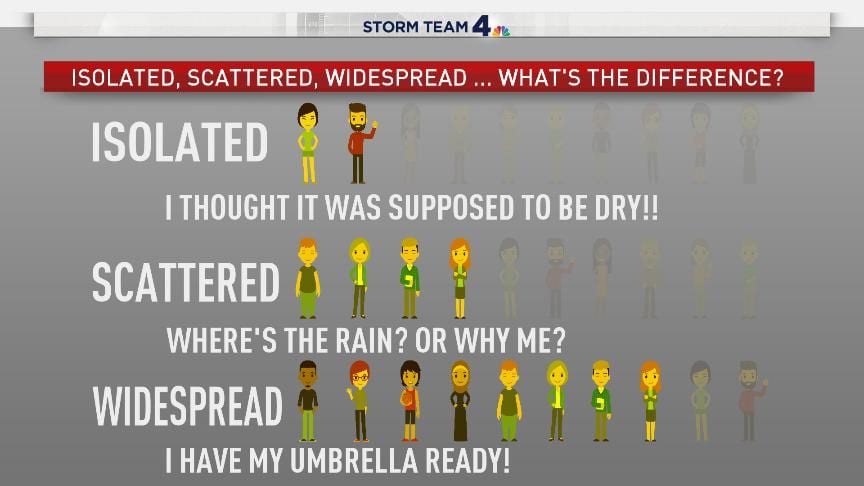Three tropical waves are forecast to move across Trinidad and Tobago from this weekend through mid-next week, bringing showers and thunderstorms to both islands. With low wind shear, high moisture, and favorable atmospheric conditions, there is the potential for heavy showers and locally strong thunderstorms, particularly from Sunday.
What you need to know
— Rainfall: Over the next five days, through Wednesday, overall rainfall accumulations across the eastern and southern halves of Trinidad are forecast to range from 50 to 150 millimeters. Across the west-central, northwestern, and north-central regions of Trinidad and Tobago, between 25 and 50 millimeters of rainfall is forecast, with isolated higher totals.
— Saharan Dust: Mild to moderate concentrations of Saharan Dust are forecast over the next five days.
— Hazards: Across the entire five-day period, the main hazards will be sporadic street/flash flooding in heavy showers/thunderstorms, which may be accompanied by gusty winds exceeding 45 KM/H, and by Monday, exceeding 55 KM/H, as well as lightning in thunderstorm activity. Landslides may be possible starting Monday evening, particularly in elevated areas of eastern and southern Trinidad and eastern Tobago.
— Marine: Seas are forecast to be moderate over the next five days, with waves in open waters generally up to 1.5 and 2.0 meters, and occasionally up to 3.0 meters Monday into Tuesday. In sheltered areas, waves are forecast to be up to 1.0 meters and choppy in showers/rain and thunderstorms.
Latest Alerts
TTMS Issues Adverse Weather Alert For T&T
Trinidad and Tobago is NOT under any tropical storm or hurricane threat, watch, or warning at this time.
The Forecast
Saturday
SaturdaySunday
SundayMonday
MondayTuesday
TuesdayWednesday
WednesdayMarine Forecast
Slight to Moderate Seas Forecast For T&T
Temperatures
Saturday
Low: 25-27°C
High: 30-32°C
Sunday
Low: 24-26°C
High: 28-31°C
Monday
Low: 23-25°C
High: 27-30°C
Tuesday
Low: 23-25°C
High: 29-32°C
Wednesday
Low: 24-26°C
High: 30-33°C
Forecast Impacts
Flooding
FloodingForecast Rainfall Totals
- Saturday: Across the eastern and southern halves of Trinidad, between 10 and 25 millimeters of rainfall, with isolated totals exceeding 25 millimeters, particularly in northeastern Trinidad. Across Tobago, west-central, northwestern, and north-central Trinidad, between 0 and 15 millimeters of rainfall, with lower totals across northwestern areas.
- Sunday: Between 10 and 30 millimeters of rainfall across Trinidad, with localized totals up to 50 millimeters favoring eastern and western coastal areas and southern Trinidad. Interior central Trinidad is set to see the least amount of rainfall on this day, and across Tobago, there will be between 5 and 15 millimeters of rainfall.
- Monday: Between 10 and 35 millimeters across both islands, with higher rainfall totals trending towards southeastern Trinidad and Tobago. Locally, higher totals up to 50 millimeters favor eastern areas of Trinidad, with lower totals trending across the western half of Trinidad.
- Tuesday: Across the eastern and southern halves of Trinidad, between 5 and 20 millimeters of rainfall, with isolated totals exceeding 25 millimeters, particularly along eastern coastal Trinidad. Across Tobago, west-central, northwestern, and north-central Trinidad, between 0 and 15 millimeters of rainfall, with lower totals across northwestern areas.
- Wednesday: Between 5 and 15 millimeters of rainfall fell across the eastern and southern halves of Trinidad, with isolated higher totals. Less than 10 millimeters fell across Tobago, west-central, northwestern, and north-central Trinidad, with the lowest totals across northwestern areas.

Understanding Rainfall Accumulations
Putting the rainfall forecast into context, rainfall rates in excess of 50 millimeters per hour or areas that receive in excess of 25 millimeters within an hour tend to trigger street flooding across the country or flash flooding in northern Trinidad. For riverine flooding to occur, a large area of the country (not just in highly localized areas of western coastal Trinidad) would have to record upwards of 75 millimeters within 24 hours, and rainfall would have to fall across major rivers’ catchment areas.

Strong Thunderstorms
Strong ThunderstormsWhat is a strong or severe thunderstorm?
Given how rare these types of thunderstorms are in our region – we classify a severe or strong thunderstorm as one that produces any of the following:
- Damaging wind gusts exceeding 55 KM/H;
- Frequent lightning (more than 30 cloud-to-ground strikes within a 10-minute period);
- Hail (of any size);
- Rainfall of more than 50 millimeters or more within an hour or exceeding 75 millimeters or more within three hours;
- The sighting of a funnel cloud or touchdown of a waterspout/tornado associated with the thunderstorm.
Gusty Winds
Gusty WindsWith winds gusting to 50 KM/H and occasionally above, whole trees can be in motion, with larger trees and weaker branches falling. Light outdoor objects can topple or become airborne, such as garbage cans, loose galvanize, construction material, and outdoor furniture. Tents may also jump.
Other Hazards
Saharan Dust Forecast
Dust-Free Days Ahead For T&T As Saharan Dust Stays North
Why I May Not/Will Not See Rainfall?
A frequent complaint is the forecast is wrong because I didn’t experience any rainfall. Scattered showers mean that you, individually, may experience some showers intermittently throughout the day, and there is a higher chance for this activity than isolated activity. Widespread showers mean that nearly all persons and areas may experience rainfall.
Throughout the forecast period, isolated to scattered rainfall is forecast, with scattered to widespread rainfall possible on Monday.

Forecast Discussion
Tropical Update
Tropical Storm Fernand Forms North of Leeward Islands
Trinidad and Tobago are forecast to be affected over the next five days by a series of tropical waves interacting with the Intertropical Convergence Zone.
On Friday night into Saturday, moisture ahead of the closest tropical wave is forecast to increase across Trinidad and Tobago, leading to an increase in cloudiness and rainfall activity, mainly across eastern and southern areas. Mid- to upper-levels of the atmosphere will generally remain dry until Saturday evening, keeping activity on Saturday generally more isolated in nature.
By Sunday, with Tropical Wave 06 moving across the area by the evening, the atmosphere is forecast to be very moist, with low to mid-level humidity very high, above 80%, and wind shear light to moderate, up to 25 knots. Low to mid-level instability is forecast to be favorable, leading to cloudy skies, locally heavy rainfall, and a supportive environment for heavy showers and thunderstorms.
During the morning hours of Monday, mid-levels may dry a bit, but the overall atmosphere is still forecast to remain quite moist and supportive of showers and thunderstorms. By the late morning, wind shear is forecast to be non-existent, averaging around 5 knots, with relative humidity above 70% and overall instability increasing into the night as Tropical Wave 07, the projected strongest of the trio, moves in. Heavy rainfall is likely on Monday night into Tuesday due to a very saturated atmosphere, veering winds, and high levels of instability. Low-level winds are forecast to increase on Monday evening through Tuesday, leading to stronger winds making it down to the surface in heavy showers and thunderstorms.
By Wednesday morning, a surge of Saharan Dust is forecast to move in, leading to the low-level and mid-level environment becoming increasingly dry and increasing wind shear. This will reduce rainfall and cloudiness, with conditions becoming increasingly hazy as the day progresses.
Reiterating that with heavy rainfall in the forecast, street/flash flooding is likely, but soils remain quite dry across nearly all of Trinidad and Tobago, with the exception being northeastern and east-central Trinidad. As a result, riverine flood chances remain low at this time, but as we near Tuesday, we’ll be keeping a closer eye on river levels.
Note that as an extended forecast goes further into the future, it is normal for the certainty to be reduced relative to the extended period.













